Online leftists are freaking out in the wake of the Supreme Court’s decision to overrule Chevron Deference. Why? Because the administrative state has been the Trojan Horse for inserting progressivism into our Republic for the better part of the last century.
Laurence Tribe, a far-left ideologue masquerading as a legal expert on TV, had a typical reaction:
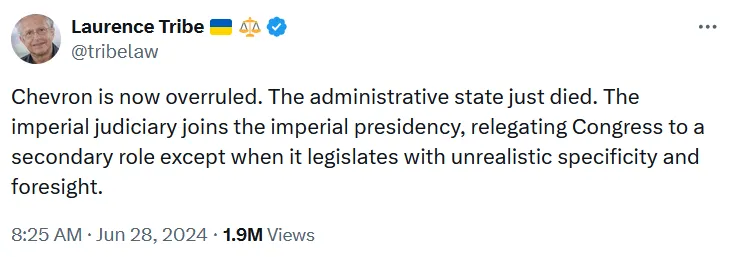
A New York Times and CNN contributor said the ruling increases the power of the executive branch:
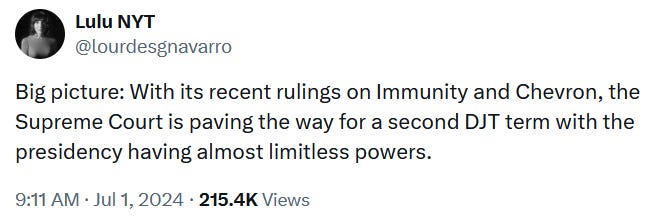
In truth, Loper Bright Enterprises v. Raimondo actually decreased the power of the executive, power that has been gradually delegated by Congress over the past century. An anonymous account on Twitter explained it succinctly:
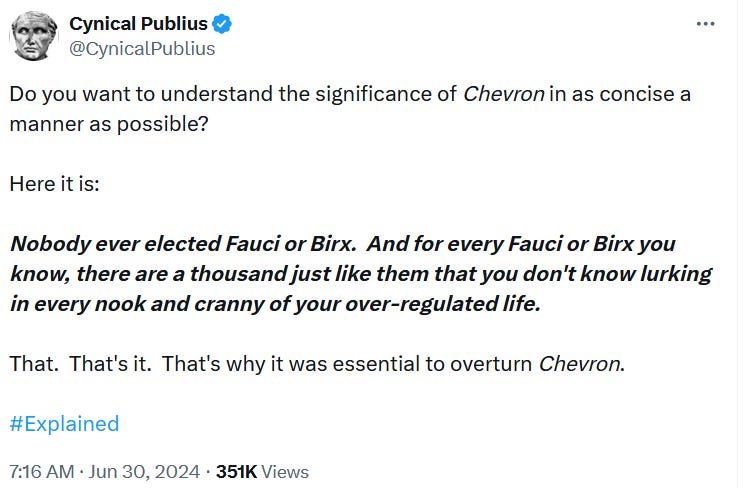
Ever since the end of World War II, there has been a sense that running the country is too important a task to be left up to whomever happens to win an election. Politicians are held captive to ideology, to electoral concerns, to promises made to their voters, which means they can’t simply do what is clearly and obviously right. Rather than allowing such people to make the important decisions, it would be better (so the thinking goes) to delegate that authority to objective experts.
One of the biggest postwar conceits was that ideology inevitably leads to conflict, but it is possible to strip away ideology and come up with ideas that work for everybody. Science and technology were marching inexorably toward a future where every human problem could be solved without resorting to ideological concerns. This became the central motivating idea of the administrative state, the army of unelected bureaucrats who would engage in the day-to-day running of the country while Congress and the president acted mostly as figureheads.
Many laws passed as part of the New Deal were deliberately left vague, allowing the myriad independent agencies that were being created to interpret them as they saw fit. President Franklin Roosevelt himself worried that the power being transferred to these agencies “…threatens to develop a fourth branch of government for which there is no sanction in the Constitution.”
In 1946, Congress passed the Administrative Procedure Act, intending to rein in the agencies and ensure they remained accountable to the legislative and judicial branches. Nevertheless, agencies continued to propagate rule after rule, building entire bureaucratic edifices outside of explicit congressional authorization. Recall how the Environmental Protection Agency interpreted the Clean Water Act of 1973 in such a way as to tell the Sackett family of North Idaho that they could not build a house near a ditch that sometimes filled with water. (The Supreme Court ruled in favor of the Sacketts last year.)
This reaction shows the true feelings of the progressive left regarding their so-called sacred democracy:

You see, if someone is to rule, it shouldn’t be judges, or even the people’s representatives. It should be experts, technocrats who know better than rubes like us. Despite their repeated claims that we are a democracy, this system of unelected bureaucrats making and enforcing their own laws instead resembles an oligarchy. The assumption at the heart of the technocratic ideal is that American citizens are not fit to govern ourselves, or even to choose representatives to govern on our behalf. No, we need experts who will rule over us for our own good. C.S. Lewis recognized this conceit many years ago:
Of all tyrannies, a tyranny sincerely exercised for the good of its victims may be the most oppressive. It would be better to live under robber barons than under omnipotent moral busybodies. The robber baron’s cruelty may sometimes sleep, his cupidity may at some point be satiated; but those who torment us for our own good will torment us without end for they do so with the approval of their own conscience.
A great example of this attitude was revealed by the Idaho Freedom Foundation’s exposé of the Department of Health and Welfare’s complete disregard for legislative intent over the past few years. Elke Shaw-Tulloch, administrator of the Division of Public Health, was caught on a Zoom call explaining how they were planning to sidestep conservative lawmakers:
We’ll see some shifts in the politics of our state over time… I actually had a really great conversation with a legislator who said it’s going to get worse before it gets better. This is some national movement and some of these very conservative organizations that are going from state to state to state to do exactly this. It’s this disruption… just know that we’re not alone. It feels yucky and gross but these, I think these sands will shift… and we’ll have to just kind of go through, ride this wave for a while and do what we can. And we might be doing some things a little bit more quietly than we used to…
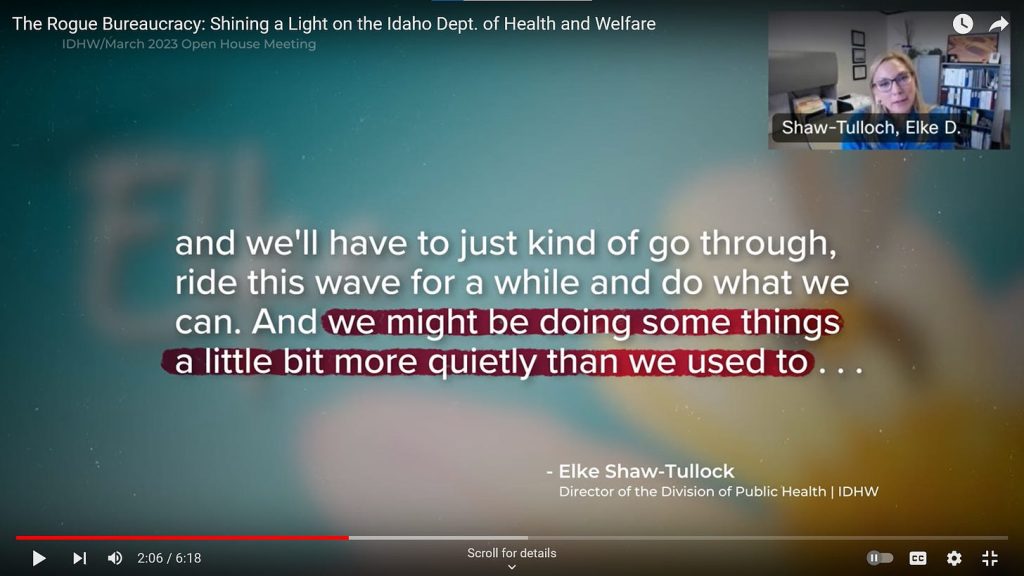
The left pulled perhaps the biggest sleight of hand in world history when they convinced Americans that their ideological program was, in fact, not ideological at all:
- Health district mask mandates were simply following “the science” but conservatives protesting were “injecting politics” into it.
- Public schools teaching critical race theory and radical gender ideology is basic pedagogy, but when parents start asking questions in school board meetings, they are “politicizing” the issue (and are probably domestic terrorists too).
- Injecting transgenderism into every facet of American life, even demanding that men must be allowed in women’s locker rooms and official government literature must say that men can get pregnant, is considered objective science, but anyone who questions such nonsense is labeled a radical bigot.
Remember when Dr. Tony Fauci, who went on cable news programs to deliver his edicts like Moses coming down from Mt. Sinai, said that criticizing him was criticizing “science”?
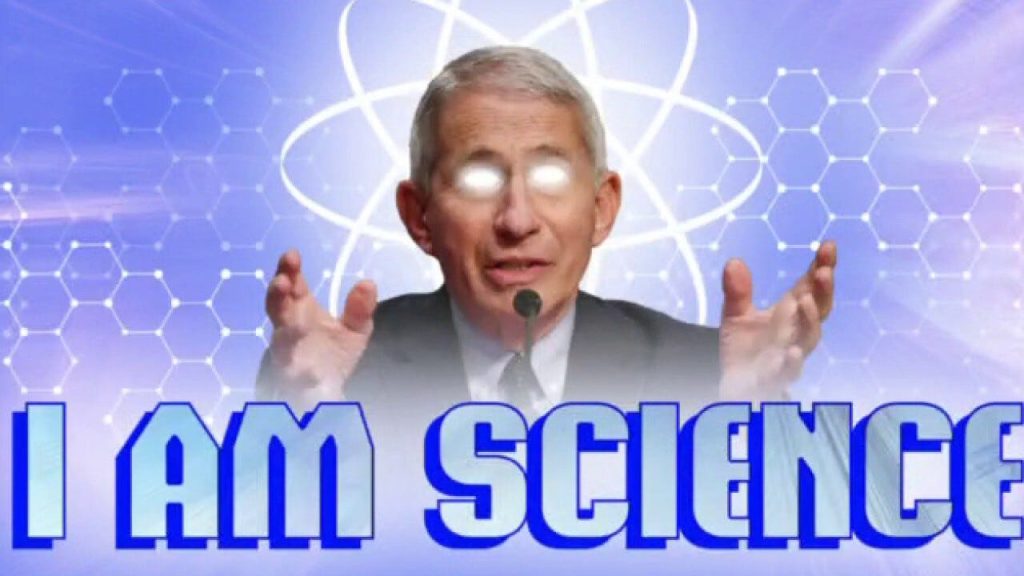
This is the essence of the technocratic mindset. “My” positions are objective, rational, and based on SCIENCE, while your positions are superstitious, backwards, and crassly ideological.
Chevron Deference meant that courts were required to defer to each agency’s own interpretation of the laws Congress passed, which were often intentionally vague. Now that the doctrine has been overturned, it’s up to Congress to actually pass laws that are narrow and specific, which might leave less time for photo ops and fundraising calls.
Sen. Mike Lee of Utah explained why this is so important in a long thread on Twitter:
For decades, Congress has relied on a lazy technique.
Rather than enacting *real* laws, Congress has delegated much of its lawmaking power to unelected, unaccountable bureaucrats.
In other words, rather than making laws, Congress has in many instances made … other lawmakers.
There are a number of problems with this approach.
The Constitution makes Congress the sole lawmaking organ of the federal government.
Article I, Section 1 — the Constitution’s first operative provision — provides that “All legislative Powers herein granted shall be vested in a Congress of the United States, which shall consist of a Senate and House of Representatives.”
Article I, Section 7 sets the standard for enacting federal laws: both houses of Congress must pass the same text, and that text (having been passed by both chambers) must be presented to the president. If vetoed, the bill passes only if both chambers override the veto with a 2/3 supermajority.
Notwithstanding the plain language of the Constitution—which makes clear that only Congress can make laws—Congress has delegated much of that power to bureaucrats in the executive branch, and in some cases to the president.
Congress passes a law stating a non-controversial objective, which we will refer to here as “X.” Congress then passes legislation declaring in essence “We shall achieve X, and we hereby delegate to agency Y the power to make and enforce laws to achieve X.”
Agency Y then makes laws — typically referred to as “rules” or “regulations” — based on what agency Y thinks is the best way of achieving X.
Agency Y thereafter enforces the same rules and regulations it writes.
Don’t let the shifting nomenclature fool you.
Rules and regulations have the effect of federal law.
In countless circumstances, failure to abide by them can result in heavy fines, having your business shut down, and even imprisonment.
For example, Congress passes a law saying in essence, “We shall have clean air, and we hereby delegate to the EPA the power to make our air clean—by making and enforcing rules and regulations (carrying the full force of federal law) to achieve that objective.
Essentially all decisions beyond that point are left to the discretion of the agency—in this example, the EPA.
How much pollution is acceptable?
How will fines be assessed?
What’s the best strategy for cleaning up the air and reducing pollution?
It’s all up to EPA.
It sounds great because nobody wants to breathe dirty air.
But what happens when EPA does something absurd?
What happens, for example, when EPA shutters a local economy by establishing standards that are unacceptable or unattainable?
In essence, no one is accountable—because the American people can’t fire the bureaucrats who make these laws we call rules and regulations.
Make no mistake, federal rules and regulations are not few in number. Last year alone, federal agencies produced about 100,000 pages of new regulatory text, as published in an annual index (in installments every few days) known as the Federal Register.
Nor are they of little economic significance. Many have tried to estimate how much these regulations cost Americans (through higher prices, diminished wages, etc.), and universally conclude that the pricetag is in the trillions of dollars—per year!
A few years ago we tried to figure out how many federal crimes are on the books. The Congressional Research Service—whose job it is to answer such questions—told us that the answer is unknown and unknowable, but likely at least 300,000. Agency regulations do this.
“Why,” you might ask, “should it matter who writes these laws if Congress approved it?”
The founders understood that the lawmaking power is the most dangerous power government has. That’s why they entrusted it only to the branch of government most accountable to the people at the most regular intervals.
When you take it away from elected lawmakers and put it in the hands of people who are accountable to almost no one, the lawmaking power becomes dangerous and unwieldy.
Bureaucrats enjoy a degree of effectively unreviewable discretion that would make history’s despots blush.
Consider the details of the case that resulted in Chevron’s demise. In 1976, Congress passed the Magnuson–Stevens Fishery Conservation and Management Act (MSFCMA), part of which required government bureaucrats to accompany fishing companies like Loper Bright Enterprises to ensure they were complying with laws regarding conservation. The Dept. of Commerce decided that the fishing companies themselves should pay the salaries of these officials, and Loper Bright estimated this was costing them $700 per day, essentially wiping out any potential profit.
Loper Bright sued, but the DC District Court dismissed the suit by applying Chevron Deference to the agency’s interpretation of the MSFCMA.
Do the leftists whinging on social media about Chevron being overturned believe it is right and proper that unelected bureaucrats should be able to extract such sums of money from private businesses, even if it drives them to bankruptcy? After all, who are we to question the experts?
Make no mistake, this ruling is a watershed moment in the long fight to take back our country. The technocratic experiment has been an abject failure, because there is no such thing as pure objectivity. It was experts who told us to stand six feet apart from each other to avoid Covid. It was experts who told us Hunter Biden’s laptop was Russian disinformation. It was experts who told us we should never leave Afghanistan.
Governing in a republic is often messy, and lawmakers need to balance expert opinion with the wants and needs of their constituents as well as potential unintended consequences. The technocratic conceit is that every human problem can be solved with the right policy, but as Thomas Sowell taught us, there are no solutions, only tradeoffs. When experts tell you that this immutable law of the universe and of human nature has been repealed, then keep your powder dry because they’re coming for your God-given natural rights, not to mention your wallet.
I think Gov. Ron DeSantis of Florida summed up the situation well:
The outcry on the left shows how they view society… They want to have rule by unelected, unaccountable, bureaucratic, so-called experts — that’s who they think should govern society. That’s NOT the way our Constitution was designed.
Gem State Chronicle is a reader-supported publication. To receive new posts and support my work, consider becoming a free or paid subscriber.
About Brian Almon
Brian Almon is the Editor of the Gem State Chronicle. He also serves as Chairman of the District 14 Republican Party and is a trustee of the Eagle Public Library Board. He lives with his wife and five children in Eagle.



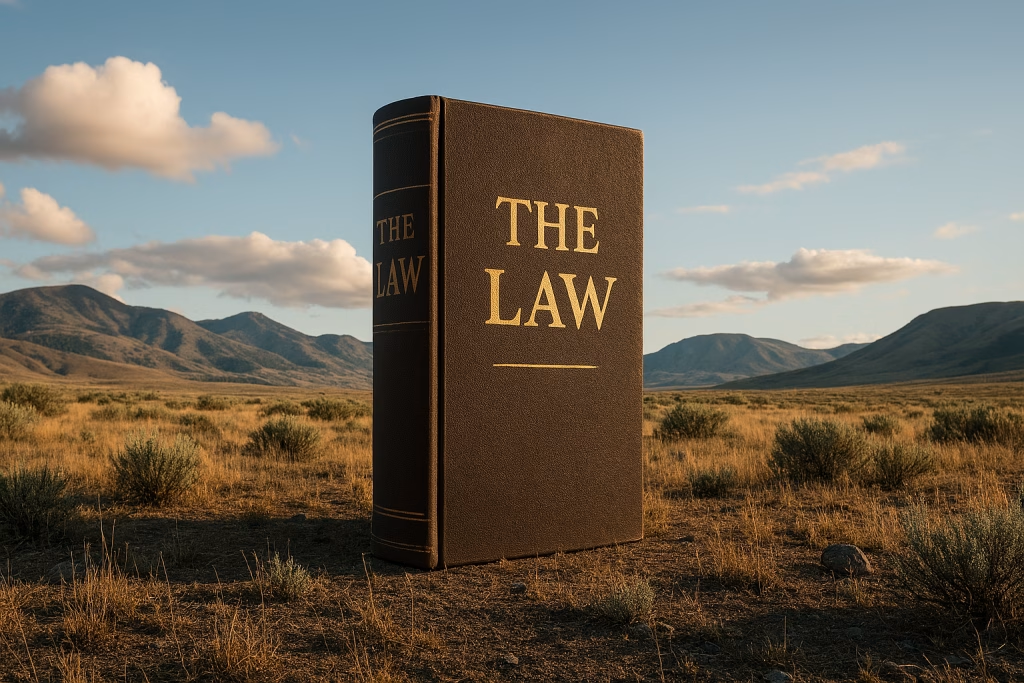

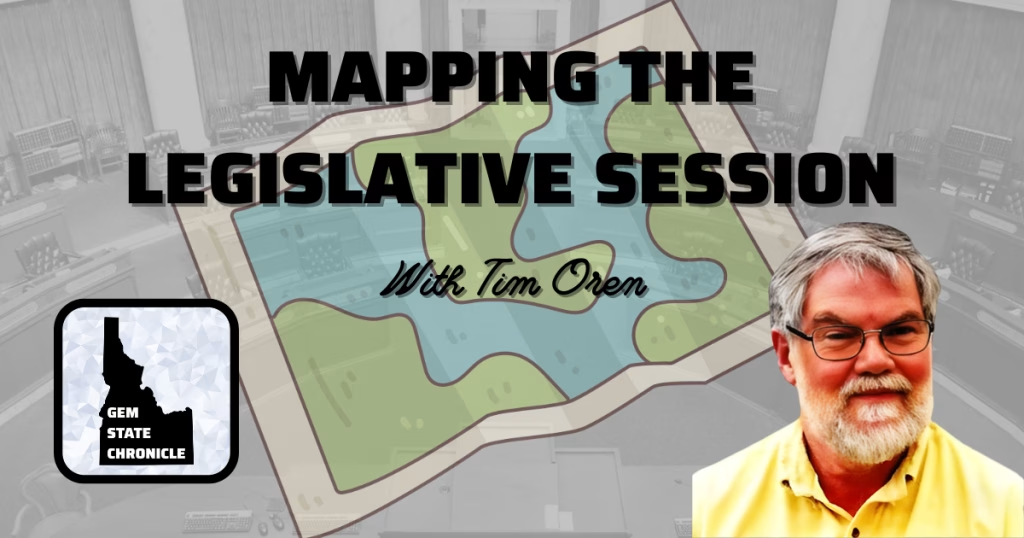



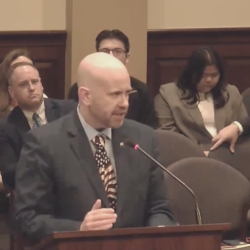



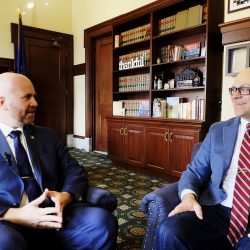
One Comment
Comments are closed.